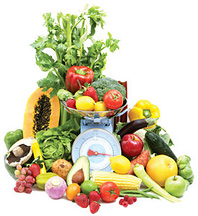Men's Nutrition: Important at Any Age
By Dr. Richard Drucker and Dr. Michael Roth
Regardless of whether a man is in his 20s, 70s or anywhere in between, sound nutrition is vital. Plenty of foods are wonderful sources of antioxidants, fiber, vitamins, essential fatty acids and other nutrients - and yet these are the very nutrients missing from many men's diets.
The truth is, even with all of the food choices out there, most males tend to be limited as far as the foods they eat on a regular basis, and all too often, their choices are unhealthy ones. Even more significantly, most men don't know what foods they should be eating or why they should be eating them.
Prior to about age 19, a male's energy requirements are fairly substantial to supply the growing needs of the body. But in general, between 19 and 50 years of age, nutritional needs slow down and don't really change all that much - depending, of course, on an individual's resting energy consumption (known as basal metabolic rate or BMR) and activity level. Energy requirements usually decrease further after the age of 50, when activity levels typically decline.
 Essentially, although men require the same basic nutrients at any age, the amounts tend to be different. At the same time, their metabolism changes and they begin to burn fewer calories, thus requiring less overall daily calories. The recommended daily intake of vitamins and minerals might remain very similar at any age, but an increase is certainly helpful as men grow older. Many middle-aged men should be getting more fiber, vitamins B6, D and E, and magnesium from sources such as eggs, whole-grain cereals and breads, nuts, seeds and green leafy vegetables. They also should be eating as many raw or organic foods as possible. At the same time, other nutrients, such as saturated fats, chromium and salt, should be reduced.
Essentially, although men require the same basic nutrients at any age, the amounts tend to be different. At the same time, their metabolism changes and they begin to burn fewer calories, thus requiring less overall daily calories. The recommended daily intake of vitamins and minerals might remain very similar at any age, but an increase is certainly helpful as men grow older. Many middle-aged men should be getting more fiber, vitamins B6, D and E, and magnesium from sources such as eggs, whole-grain cereals and breads, nuts, seeds and green leafy vegetables. They also should be eating as many raw or organic foods as possible. At the same time, other nutrients, such as saturated fats, chromium and salt, should be reduced.
 Typically, American men ages 19 to 50 consume more calories and fat than recommended. As a result, nearly 25 percent of American men are overweight or obese. Unfortunately, excess calories, sugar, starches, cholesterol and saturated fats are related to heart disease and cancer, the two leading causes of death in the U.S., as well as gallbladder disease, prostate hyperplasia (BPH) and type 2 (adult-onset) diabetes. Increased intake of specific nutrients such as beta-carotene, vitamin C, vitamin E and fiber, along with a reduction in refined sugars and fats, has been shown to be beneficial in the prevention of these diseases.
Typically, American men ages 19 to 50 consume more calories and fat than recommended. As a result, nearly 25 percent of American men are overweight or obese. Unfortunately, excess calories, sugar, starches, cholesterol and saturated fats are related to heart disease and cancer, the two leading causes of death in the U.S., as well as gallbladder disease, prostate hyperplasia (BPH) and type 2 (adult-onset) diabetes. Increased intake of specific nutrients such as beta-carotene, vitamin C, vitamin E and fiber, along with a reduction in refined sugars and fats, has been shown to be beneficial in the prevention of these diseases.
Many men overlook what have been coined "superfoods," which have been shown to be rich in nutrients and antioxidants. Superfoods include watermelon, red grapefruit, tomatoes, beets, cabbage, guava, Swiss chard, cinnamon, purslane, pomegranate juice, goji berries, prunes, pumpkin seeds, salmon, beans, blueberries, quinoa, walnuts/almonds, spinach and artichokes.
Proper supplementation is not only wise, it's also often necessary. Many foods don't have enough organically complex minerals and enzymes due to soil depletion and overfarming. Additionally, as men age, not only do their nutritional requirements change, but stomach acid production also begins to taper off, resulting in impaired digestion. At that point, it's often difficult to utilize the limited nutrients our foods do contain. Therefore, it's equally important to consume additional organically complex minerals, enzymes and probiotics by taking supplements.

